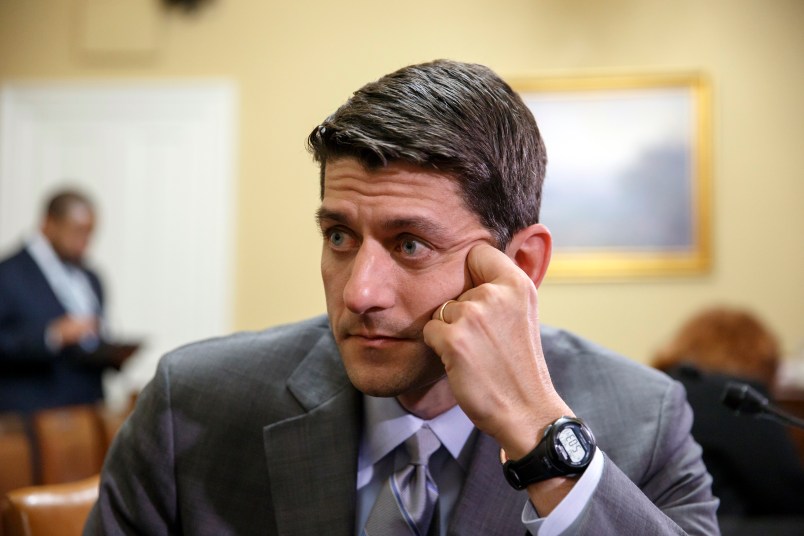Drowned out last week by rumors that Republican Mitt Romney may run for president again in 2016, the announcement Monday by Romney’s 2012 vice presidential running mate Paul Ryan that he won’t be running for president next year was quickly reported and then mostly discarded as a non-story.
Ryan’s decision to pass on 2016 is hardly surprising, and makes perfect political sense for the Wisconsin congressman. The field of potential candidates is already long and may get longer. And incumbent House members just don’t win the White House: The last to do so was James Garfield, in 1880. Heck, House incumbents don’t even win the vice presidency (e.g. Democrat Geraldine Ferraro in 1984 or Republican William Miller in 1964).
But just because Ryan is opting not to run in 2016 doesn’t mean the Republicans who do declare their presidential intentions can politely sidestep or ignore him. In fact, they will need to prove they’re Ryan-worthy candidates when it comes to fiscal matters.
Recall that, months before Romney tapped Ryan in summer 2012 to join the national ticket, the field of Republican presidential contenders had already pledged its fealty to Ryan’s budget plan. Ryan’s perch in the 114th Congress as the new House Ways & Means Committee chairman only bolsters his credentials and enlarges his platform as the party’s fiscal kingmaker.
Those with fuzzy memories of the sometimes testy 2012 Republican presidential primary are invited to ask Newt Gingrich for a quick refresher course. After all, it was Gingrich—the lead architect of the 1994 “Republican Revolution” that swept the GOP into control of both chambers of Congress for the first time in 40 years—who learned the hard way what happens when national Republicans dare to doubt the policy clout Ryan and his House Republican colleagues wield.
The setting was a May 2011 appearance by Gingrich on Meet the Press. Asked by then-host David Gregory what he thought of Ryan’s widely-discussed budget plan, which among other provisions included a significant overhaul of Medicare, the bombastic Gingrich blasted away, calling it a “radical” approach and “right-wing social engineering.”
The former speaker’s words pinballed quickly inside as well as beyond the Beltway precisely because they sounded as if they’d been ripped from a Democratic National Committee press release. (And yes, the DNC and countless liberals gleefully capitalized.)
“Gingrich has distanced himself from the Ryan plan in recent weeks, calling instead for a system that would preserve the current Medicare program alongside a voluntary, privatized version,” wrote TPM’s Benjy Sarlin, at the time. “But nothing he has said came close to the full frontal assault he unleashed on his own party’s top priority in Congress.”
As I explain in my new book, The Stronghold: How Republicans Captured Congress but Surrendered the White House, what’s perhaps most ironic about the Gingrich-Ryan spat is that Gingrich should have known from personal experience that members of Congress, even in the “lower” House, can often impose their agendas and influence presidential politics. And right now, the Republicans are a very House-dominant party, even moreso than during in Gingrich’s era.
During the mid-1980s, the upstart Gingrich and a coterie of fellow House Republicans like Vin Weber launched and developed the themes for the Conservative Opportunity Society as a way to change the national policy conversation. Shortly thereafter, Republican president Ronald Reagan emphasized these themes in his 1984 State of the Union speech and two months later in the president’s keynote address at the annual meeting of the Conservative Political Action Committee.
Now pause to consider the power gap between Gingrich and Reagan in 1984, compared with that between Gingrich and Ryan in 2011.
In 1984, Gingrich was a member of the GOP House minority—no committee or subcommittee chairmanships—and not yet part of the top House Republican caucus leadership; yet Reagan, a popular president headed later that November for a 49-state coronation, was delivering words from Gingrich’s pen. A quarter-century later, with Paul Ryan driving the party’s budget policy agenda as then-chair of the powerful House Budget Committee while Gingrich was a mere presidential aspirant by that point out of office for fully 14 years, Gingrich nevertheless thought he could scorn Ryan and the House Republicans with impunity—and act he would never have permitted during his own House days.
Within the party and in conservative policy and media circles, the pushback against Gingrich for his May 2011 criticisms of Ryan was so swift that in short order the former speaker publicly apologized to the Wisconsin congressman. And eventually, of course, Gingrich and all the other GOP presidential hopefuls fell in line behind Ryan’s plan.
So, indeed, the smart play for Ryan this cycle is to remain on the sidelines, where the new Ways & Means chair can quarterback the party’s fiscal proposals and messaging, just as he did last cycle and no matter whom Republican primary voters nominate in 2016.
He may not be running for president in 2016, but that doesn’t mean Paul Ryan will be invisible in the Republican race for the White House.
Thomas F. Schaller is professor of political science at UMBC and a twice-monthly columnist for the Baltimore Sun.







Paulie
Poot of the Loom.
“Paul Ryan May Not Be Running In 2016, But He’ll Loom Large Over The Election”
Paul Ryan May Not Be Running In 2016, But He’ll Hang Like A Pall Over The Election
FIFY
Fine, let’s take a closer look at VP Ryan’s ideas, like we did in 2012.
Loser.
The funniest part of the Gingrich comments were that they were true, at a time when people were questioning Ryan as the brain child of modern conservatism. Gingrich has these moments where he slips and speaks the truth. It generally gets him in trouble. The really scary thing, however, is Rep Price (R-GA) as the new chairman of the budget committee. He is TP wingnut supreme. If McConnell wants the GOP not to “scare” people…he is the polar opposite of what you’d want there. He is already saber rattling about Social Security